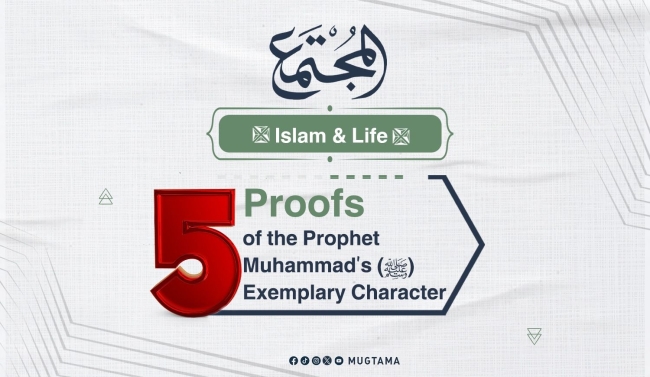5 Proofs of the Prophet Muhammad’s (ﷺ) Exemplary Character
Some Muslims imagine that the Prophet Muhammad (ﷺ) is distinguished solely because of his prophethood and infallibility. However, they overlook a very important aspect: the Prophet’s character was distinguished by perfection in several areas due to its alignment with the pure, innate nature that Allah created people with. There are traits in which the Prophet Muhammad (ﷺ) reached the pinnacle of perfection, making him a mercy to the worlds and a guiding light. These include qualities in manners, interactions, good character, and wisdom, which qualify any person to be distinguished. These qualities were all present in the best of creation, the Prophet Muhammad (ﷺ).
Among the testimonies to his impeccable character is his perfection in various clear aspects, both moral and physical, which include:
- Eloquence and Articulateness:
Allah sent him to a people known for their eloquence and language, and the Prophet Muhammad (ﷺ) was an exemplary figure of eloquence. When his people excelled in the arts of speech, Allah endowed him with the eloquence of the tongue, clarity of expression, and comprehensive words. His speech combined brevity and clarity in few words, without complexity, pretension, roughness, or harshness. His words were few in letters, abundant in meanings, free from artificiality. All of this is a sign of his prophethood.
- Uprightness and Balance in Life:
An observer of the Prophet’s Seerah will find that he did not deviate in his youth, nor did he submit to his desires or overwhelming lusts. He was the most averse to idolatry, and he designated the month of Ramadan every year to retreat in the cave of Hira to worship, isolating himself from those around him.
- Moral Perfection:
The ethics of the Prophet Muhammad (ﷺ) were a shining example of moral perfection and commendable actions instilled by Allah in His servants, such as loyalty, chivalry, modesty, and chastity. He was described as the truthful and trustworthy among the Quraysh society. Such a testimony from his people, who fought him after his mission and prophethood, speaks volumes. They never doubted his truthfulness or questioned his trustworthiness. The Arabs adhered to some of the good morals remaining from the Sharia of Ibrahim (peace be upon him). The Prophet Muhammad (ﷺ) was sent to complete and perfect these good morals, as he said in the authentic hadith: “I was sent to perfect good character.”
- Sound Mind and the Quraysh’s Consensus on His Love:
The Prophet Muhammad (ﷺ) was distinguished by his sound mind and wisdom. The divine message could not have come to anyone other than a person of complete intellect. He grew up with a fully developed mind since his youth, which his grandfather Abdul Muttalib recognized, raising him with the morals of men from a young age. The Quraysh acknowledged his sound mind and wisdom in his youth, inviting him to their meetings. It is narrated that he attended the “Hilf al-Fudul” (Alliance of Virtue) at the house of Abdullah ibn Jad'an.
One instance of his sound mind is that he did not engage in the disputes of the pre-Islamic era. When there was a dispute over who would place the Black Stone, the Quraysh accepted his judgment. He resolved the conflict peacefully, after the people almost fought, by involving all the tribes, and they were satisfied with his judgment, thus ending the disagreement among them.
- Testimony of His Opponents:
The Prophet Muhammad’s (ﷺ) character was admired by people in the past and present. Urwa ibn Mas’ud al-Thaqafi, while still an idolater and disbeliever, expressed his admiration for the Prophet when he saw the companions’ love for him. He said, “I have visited the kings and seen Caesar, Khosrow, and the Negus, but by Allah, I have never seen a king as venerated by his companions as Muhammad is by his companions. When he commands them, they hasten to comply; enerated when he performs ablution, they almost fight over his ablution water; when he speaks, they lower their voices in his presence, and they do not stare at him out of respect for him.” Not to mention, modern Orientalists have expressed admiration for his character, perfection, and the greatness of his message.
-------------------------------------------------------------







